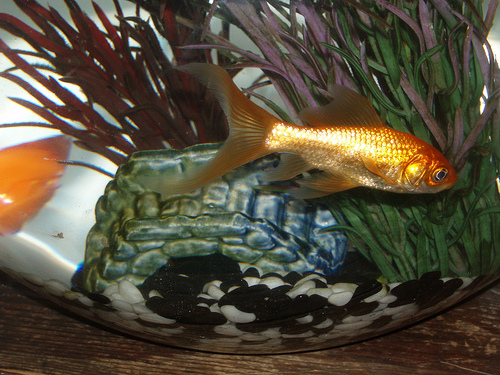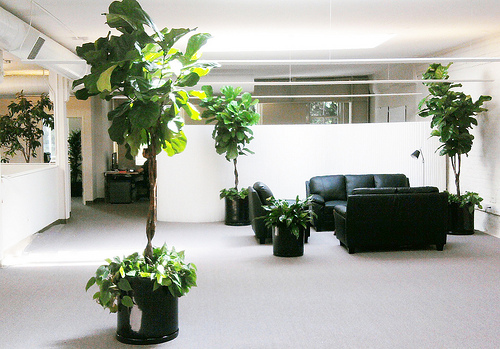When it comes to feng shui, the ideal office is a square or a rectangle with solid walls, a window for natural light and a door that can be closed.
Of course, we know that's not the reality for most offices these days. We're guessing most employees don't have their own offices, and nowadays, with the advent of open workspaces, many don't even have their own cubicle. Still, there are ways you can implement feng shui in your workspace via organization, positioning, colors and artwork.
What You Need to Know First:
According to Feng Shui Basics and Beyond, there are three fundamentals you need to understand about the practice to get started: Everything is alive and made of energy or chi, everything is connected and everything is changing. This means the universe, you and your office are all connected. By incorporating it into where you live and work, you can increase positive energy, focuses intentions, helps convey subliminal messages to your subconscious and creates a sacred space.
Here are some areas to focus on:
Glass walls:?If you happen to have an office with walls, solid walls are preferable to glass. solid walls give you a feeling of security and protection. Glass walls contribute to a feeling of vulnerability. If you have glass walls, consider installing mini-blinds to help give you privacy a sense of safety.
De-clutter:?One of the first steps to practicing feng shui at work is clearing out clutter to help gain clarity, focus and peace of mind, according to Feng Shui Basics. Whatever you use daily should be neatly stacked and organized and within arms reach, everything else should be sorted, filed and stored.
Seating position?: The best seat in the house when it comes to an office or cubicle is one that faces the entrance (as opposed to a wall or window) so that you can see who's coming. In an office, the ideal place for your desk is the farthest corner from the door, according to Inc.com. Of course, with most cubicle design, your back often faces the entrance. To remedy this, place an 8-by-10-inch mirror facing the entrance so you can not only keep track of who's approaching you, but also feel like you're moving forward and not getting stuck.

One element of feng shui is water, which can be incorporated via anything from an office goldfish, to a portable fountain to a picture of a waterfall.
In your element:?There are five elements in Feng shui: Wood, fire, earth, metal and water. According to Inc., you should incorporate each into your office in some form, making sure to use a balance of all as to not disrupt your chi. You can incorporate these elements via furniture choice, artwork or color so long as they represent what you want to accomplish and inspire you toward prosperity and success. Each element has a different purpose, according to Inc.:
Wood – promotes creativity and symbolizes loyalty, according to Inc.com. The colors that best represent wood are green and brown and incorporating them into your office should promote motivation, inspiration and good health. Your wood element should be placed in the east corner of you workspace.
Fire – The most aggressive of elements, it represents passion and excitement and should boost productivity and action when used at work. Naturally, it's associated with the color red. Your fire element should be placed in the south corner of your workspace.
Earth – Promotes balance and stability and is useful for building and maintaining relationships. The colors to use are earth-tones: Sandy tones, light browns, yellows and oranges. This element should be featured in the center of your workspace and could also be made of clay, brick or ceramics or a art featuring a landscape.
Metal – This if your go-to element for financial success. Use silver, grey, gold or other metallic tones or incorporate stone, gold, copper, marble or silver pieces in the western corner of your workspace.
Water – Help start conversations and promote networking, travel and wisdom with this element. Use the colors blue or black or incorporate a mirror, fountain, fish bowl or something made of glass. Your water element belongs in the northern portion of your workspace.
Lighting:?Fluorescent lighting is the enemy of feng shui. The antidote is natural light. If you don't have access to a window then the next best thing is full-spectrum tube (sometimes called grow lights) that can be purchased at a hardware store. If you can't (or aren't permitted to) replace the ghastly fluorescent lighting, then supplement with incandescent floor lamps and desk lamps.

In feng shui, adding plants to your office can help bring you closer to nature and create energy.
Plants are your friends: In feng shui, green things are good. They can be used to counteract back things. Have a weird pillar or ugly duct obstructing the energy flow in the room? Stick a plant in front of it. Just remember to keep an odd number of plants around and keep them healthy (no wilting plants need apply for your cubicle).
According to the experts, incorporating feng shui into your workspace can enhance creativity and success.
Photos courtesy of tiffany terry/Flickr and Plant Rental/Flickr





